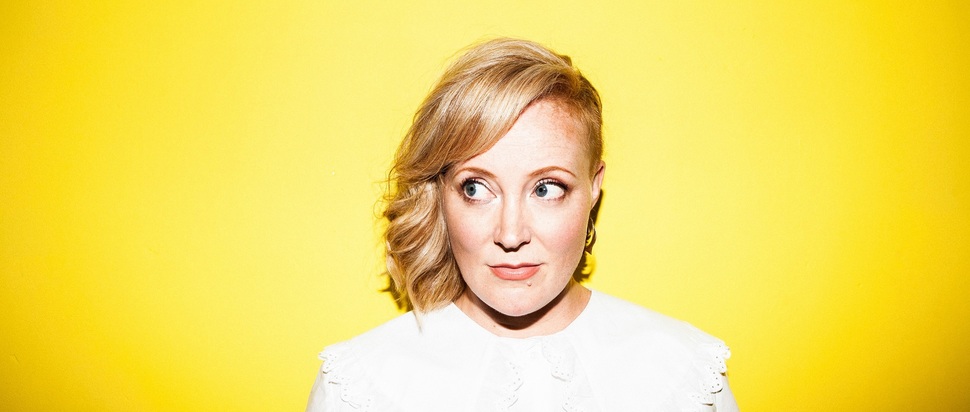Emma Jane Unsworth on Adults, foxes and (not) coming of age
Emma Jane Unsworth writes unapologetic novels about unapologetic women. Her latest, Adults, is no different. We chat messy relationships, women's appetites and how television has become the place to be for female creators
Halfway through Animals, the critically acclaimed film adaptation of Emma Jane Unsworth’s novel, a fox wanders the darkened, party-soaked streets of Dublin, pausing momentarily to lock eyes with the film’s charismatic, exuberant and deeply adrift protagonist, Laura, before scarpering away. For most, it immediately calls to mind 2019’s other iconic foxy moment, when Phoebe Waller-Bridge’s Fleabag has her own vulpine encounter in the show’s final scenes – an overlap that was, it turns out, entirely coincidental.
“I hadn’t seen the second season of Fleabag yet,” confesses Unsworth, who adapted Animals for the screen herself. “Our producer Sarah Brocklehurst texted me and was like, ‘oh my god, they've used a fucking fox!’” She laughs down the phone, tickled by the absurdity of it all. “I mean, she has a moment with the fox, we have a moment with the fox... Jesus Christ, what are the chances? So we just had to put it down to beautiful synchronicity,” she chuckles.
Synchronicity aside, it is a moment that's perfectly suited to Animals, as both film and book linger in the wildness and viscerality of women’s lives. The story of an intense friendship between two hedonistic young women, the book, particularly, is a tumultuous, uninhibited read, each page soaked in wine, MDMA and desire. “It should come with a government health warning, that book,” Unsworth says, half apologetically, half with relish. But giving expression to women’s untamed appetites and behaviours is deeply important to her. “I just love, love writing about women's bodies and the heightened sensory experiences involved in feeling like you're an animal. I'm so interested in that interplay, in that exchange between the wild and civilised parts of people. It comes down to the body in a glorious, joyous way that I want to enjoy, while also acknowledging that it can be a prison for women.”
Her new novel, Adults, builds on this, focusing on Jenny, a 35-year-old woman fresh from a break-up and on the brink of losing her job, her friends, and her grip on her mental health. Although Adults is perhaps more obviously of the zeitgeist than Animals – the potential darkness and toxicity of social media forms a key part of Jenny’s narrative – both novels centre on millennial women in their thirties who are still entrenched in the process of emotionally and physically becoming, subverting the traditionally teenage coming-of-age story. “I suppose it’s because I feel it's a myth that you ever come of age, I really think it's total crap,” Unsworth laughs. “No one ever comes of age. Or maybe what we do is come of age over and over and over again throughout our lives.”
This constant process of identity formation plays out in Jenny’s relationships, much as it did in Laura’s. But while Animals zeroed in on the latter’s entwined, fiercely co-dependent friendship with one person, Adults takes a broader perspective, incisively yet compassionately laying bare Jenny’s relationships with her mother, best friend and co-workers. In a book so thematically focused on romantic relationships, sex and loneliness, prioritising these female connections is an almost radical act.
“I'll always write about intense relationships between women because that's what interests me the most,” explains Unsworth. “One of my favourite things to do is play around with romantic comedy tropes but put them in a different context where it's not a man and a woman, [instead] in the context of two friends or a mother-daughter bond.” Much like in Animals, the real love story – its exhilaration, its pain, its fractiousness – is in the relationships between women, relationships that both rupture and repair.
The attention that Unsworth pays to the intimate, interior and unkempt experiences of women has drawn comparisons to Phoebe Waller-Bridge (fox and all) and Irish novelist Sally Rooney. Does Unsworth find these comparisons empowering or limiting? “I wish there were more names!” she says fervently. “I love both of them – I think they're geniuses – and I'm so glad that their works are out in the world. But I just wish we had more voices and more diversity. I think it would be great if there were many more women that we could refer to.”
For Unsworth, television seems to be the place allowing for more diverse voices. She points to her peers Rooney and Candice Carty-Williams as other novelists who are adapting their bestsellers, while Adults is already set to become a television series with Unsworth on screenwriting duties. Television, she explains, is increasingly becoming a space where women can tell authentic, unapologetic stories. “I don't like redemption stories and I don't like super neat happy endings where everything is jolly and shiny and Hallmark,” Unsworth states firmly. “I don’t want my work to be a cautionary tale. I've got many more questions than I've got answers.” In Adults, as well as Animals, it’s a joy to hear her ask them.
Adults by Emma Jane Unsworth is published on 30 Jan by Harper Collins
Jenni Fagan, Kirstin Innes & Emma Jane Unsworth: Writing Rebel Women, Paisley Arts Centre, 23 Feb, 5pm, £6-10
